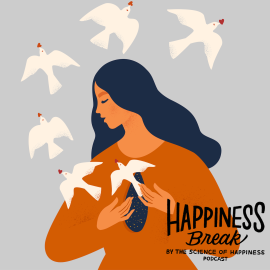Scroll down for a transcription of this episode.
Join our limited newsletter The Science of Habits to get curated, science-backed tips to help make your New Years resolution stick in 2024.
https://ggsc.berkeley.edu/podcasts/habits
When we practice forgiveness, studies show we can have healthier relationships, higher self-esteem, and less anxiety and depression.
Link to episode transcript: https://tinyurl.com/mt9uwad8
How to Do This Practice:
- Find a comfortable place to begin the practice. Soften your gaze and take a few slow, deep breaths.
- Imagine there is a light made of compassion, love and understanding all around you.
- As the light comforts you, think of a person you would like to seek forgiveness from. Take note of any emotions that arise. Imagine sincerely apologizing to them.
- Visualize a bridge connecting you and the individual. Know that while forgiveness is not always immediately accepted, you’ve taken the first step towards healing.
- Turn your forgiveness towards yourself, breathing in love and compassion.
- End this practice by reconnecting with your body and refocusing your gaze, remembering that the journey of forgiveness is ongoing.
Today’s Happiness Break host:
Shelly Tygielski is a trauma-informed mindfulness teacher based in Florida.
To get Shelly Tygielski and Justin Michael Williams’ book How We Ended Racism: go to howweendedracism.com or your favorite book seller.
Learn more about Shelly’s work: https://tinyurl.com/26xkdnku
Follow Shelly on Instagram: https://tinyurl.com/4k4bx3nn
Follow Shelly on Facebook: https://tinyurl.com/bdfsb9pt
Follow Shelly on Twitter: https://tinyurl.com/2edu2fzu
More resources from The Greater Good Science Center:
Eight Keys to Forgiveness: https://tinyurl.com/2s4hbz3a
The New Science of Forgiveness: https://tinyurl.com/5f2c7sfb
How to Overcome Barriers to Forgiveness: https://tinyurl.com/22zteuyj
The Power of Forgiveness at Work: https://tinyurl.com/mrx5hzvh
How to Build a More Forgiving Community: https://tinyurl.com/5frja2h2
We love hearing from you! Tell us about your experience with forgiveness. Email us at happinesspod@berkeley.edu or use the hashtag #happinesspod.
Find us on Spotify: https://tinyurl.com/6s39rzus
Help us share Happiness Break! Rate us and copy and share this link: https://tinyurl.com/6s39rzus
We’re living through a mental health crisis. Between the stress, anxiety, depression, loneliness, burnout — we all could use a break to feel better. That’s where Happiness Break comes in. In each biweekly podcast episode, instructors guide you through research-backed practices and meditations that you can do in real-time. These relaxing and uplifting practices have been shown in a lab to help you cultivate calm, compassion, connection, mindfulness, and more — what the latest science says will directly support your well-being. All in less than ten minutes. A little break in your day.
Transcript:
Dacher Keltner: I’m Dacher Keltner, Welcome to Happiness Break, where we take a few moments out of our day to do practices shown by science to improve your life.
Studies suggest that when we’re more self-forgiving, we feel more worthy of love and our relationships become more satisfying.
So today’s meditation invites you to journey within. Confronting past mistakes, offering sincere apologies, and asking forgiveness from others — and ourselves.
Our guide today is Shelly Tygielski, a trauma-informed mindfulness teacher. Here’s Shelly.
Shelly Tygielski: In this equally exhilarating, yet challenging experience called life, being human means that moments of discord are inevitable.
So today, I’m going to be leading a meditation about forgiveness. Allow yourself to sit comfortably in a quiet place away from distractions. I invite you to close your eyes or lower your gaze, whichever is more comfortable for you, and begin by taking a deep, long inhale in through your nose. Filling your lungs entirely, then exhaling slowly through your mouth. Releasing any tension or stress you might be holding onto.
The act of seeking forgiveness remains a powerful bridge to healing and harmony. This meditation practice invites you to journey within. Confronting past mistakes and offering sincere apologies. And as you continue to breathe deeply, imagine that there is a gentle light surrounding you. A light that represents love, understanding, and compassion. Feel it warming and comforting you.
Now bring to your mind’s eye a situation or a person to whom you seek forgiveness from. Visualizing this clearly and allowing any emotions to arise without judgment.
Feel them. Acknowledge them. And then let them be.
Imagine that you are standing before this person or recalling the situation and from the depth of your heart, you are saying, “I am truly sorry. I am truly sorry.”
Feel the weight and sincerity of these words, letting the emotions flow, naming them, remorse, sorrow, or any other feelings that may arise.
Envision the person or situation receiving your apology. And imagine a bridge of understanding forming, connecting you both.
Asking for forgiveness does not always mean it will be immediately granted. And that’s okay. What’s important is your genuine intention and the step you’ve taken towards healing and mending.
Now let’s direct some compassion towards yourself. Repeat silently in your heart.
May I be forgiven.
May I forgive myself.
May I learn and grow.
Breathe deeply, inhaling love and compassion and exhaling any remnants of sorrow.
Allow yourself to feel lighter and at peace, knowing you have taken a step towards reconciliation.
And as this meditation draws to a close, keep with you the sincerity and intention of your heart. Remembering that the journey to forgiveness is ongoing. Slowly bringing your awareness now back to your surroundings. You can wiggle your fingers, wiggle your toes and wherever you are, you can gently open your eyes or widen your gaze.
May you find the forgiveness you seek and may you always walk in love and understanding.









Comments